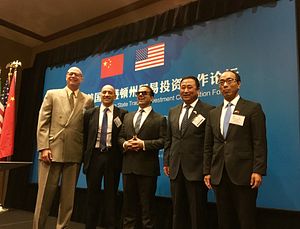Washington state took the lead to advance U.S.-China subnational engagement on trade and investment cooperation on July 20, 2017, the day after the U.S.-China Comprehensive Economic Dialogue (CED) resulted in an impasse. As the Trump’s administration’s repackaged version of the former Strategic and Economic Dialogue (S&ED) – the Obama administration’s new moniker of the original Strategic Economic Dialogue (SED) initiated by U.S. President George W. Bush and Chinese President Hu Jintao in 2006 – the CED marked the current White House’s efforts to formalize a strategic-level bilateral trade dialogue framework.
In parallel with the past SED, S&ED, and the recently launched CED, U.S.-China subnational cooperation initiatives – spearheaded in 2011 by the U.S. State Department’s Office of Global Intergovernmental Affairs, Bureau of East Asia and Pacific Affairs (EAP), and U.S. Mission in China – have sought to “develop a platform to provide structure for engagement, allow deeper and more comprehensive dialogue and exchange, and produce tangible and enduring benefit for states, provinces, and cities.” U.S.-China subnational engagement initiatives under the Trump presidency focus on four key areas: trade and investment, security and diplomacy, social entrepreneurship, and cybersecurity and law enforcement.
As a precursor to the July 19 CED talks in Washington DC, the 100-day bilateral trade action plan resulting from the April summit between Presidents Donald Trump and Xi Jinping at Mar-a-Lago underscored the growing importance of U.S.-China subnational engagement efforts in trade and investment.
With China as its top export market, Washington state understands the long-term strategic impact of healthy trade relations with China on Washington’s economy at the state, county, and city levels. Washington’s exports to China supported 83,800 jobs in 2015, and the state has received $611 million in Chinese investment since 2000. With its first purchase of ten 707 Boeing planes in 1972, China’s longstanding trade relationship with Washington state saw the arrival 637-foot Liu Lin Hai into Seattle’s Pier 91 in April 1979 – the first ship from the People’s Republic of China to dock at an American port in 30 years. The subsequent historic visits of four Chinese leaders to Seattle – Deng Xiaoping (1979), Jiang Zemin (1993), Hu Jintao (2006), and Xi Jinping (2015) – have elevated Washington state’s priority position among China’s top U.S. subnational trading partners.
Building on the state’s strong foundation as the top U.S. state exporter to China, the Washington State Commerce Department and People’s Republic of China’s Ministry of Commerce co-convened the first-of-its-kind Chinese Provinces–Washington State Trade and Investment Forum. In collaboration with the Washington State China Relations Council and PRC Consul General of San Francisco, the conveners cooperated to promote subnational trade and investment cooperation in key sectors: information and communication technology, agriculture and food processing, clean and bio tech, advanced manufacturing, e-commerce, and real estate. Forum attendees included approximately 170 government and business delegates representing the Chinese provincial governments of Shanghai, Guangdong, Liaoning, Shaanxi, Hunan, and Beijing and Washington state county and city economic development councils along with more than 50 Chinese and U.S. companies, such as Alibaba, East West Bank, Inspur, ICBC, JD.com, Modern Land, WSP, ZTE, among others.

































